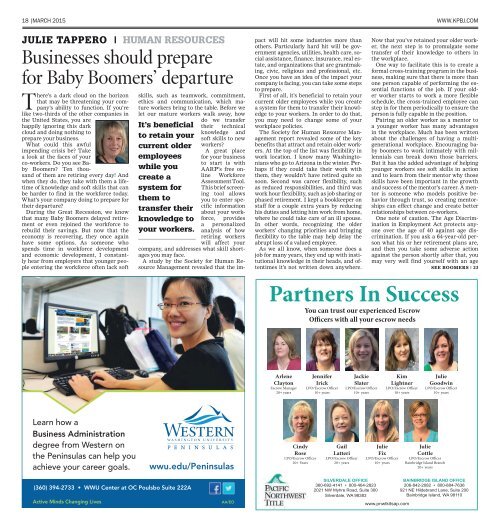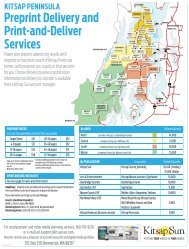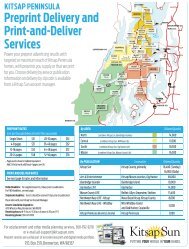Last Frontier KPBM March 2015
Bank branches are changing, but not going away. A regional director’s tips for SBA loans and our feature, Last Frontier explores how a national bank’s recession failure sent local companies scrambling as foreclosures came down.
Bank branches are changing, but not going away. A regional director’s tips for SBA loans and our feature, Last Frontier explores how a national bank’s recession failure sent local companies scrambling as foreclosures came down.
You also want an ePaper? Increase the reach of your titles
YUMPU automatically turns print PDFs into web optimized ePapers that Google loves.
18 |MARCH <strong>2015</strong> WWW.KPBJ.COM<br />
julie tappero<br />
There’s a dark cloud on the horizon<br />
that may be threatening your company’s<br />
ability to function. If you’re<br />
like two-thirds of the other companies in<br />
the United States, you are<br />
happily ignoring this dark<br />
cloud and doing nothing to<br />
prepare your business.<br />
What could this awful<br />
impending crisis be? Take<br />
a look at the faces of your<br />
co-workers. Do you see Baby<br />
Boomers? Ten thousand<br />
of them are retiring every day! And<br />
when they do, they take with them a lifetime<br />
of knowledge and soft skills that can<br />
be harder to find in the workforce today.<br />
What’s your company doing to prepare for<br />
their departure?<br />
During the Great Recession, we know<br />
that many Baby Boomers delayed retirement<br />
or even rejoined the workforce to<br />
rebuild their savings. But now that the<br />
economy is recovering, they once again<br />
have some options. As someone who<br />
spends time in workforce development<br />
and economic development, I constantly<br />
hear from employers that younger people<br />
entering the workforce often lack soft<br />
| human resources<br />
Businesses should prepare<br />
for Baby Boomers’ departure<br />
skills, such as teamwork, commitment,<br />
ethics and communication, which mature<br />
workers bring to the table. Before we<br />
let our mature workers walk away, how<br />
do we transfer<br />
it’s beneficial<br />
to retain your<br />
current older<br />
employees<br />
while you<br />
create a<br />
system for<br />
them to<br />
transfer their<br />
knowledge to<br />
your workers.<br />
their technical<br />
knowledge and<br />
soft skills to new<br />
workers?<br />
A great place<br />
for your business<br />
to start is with<br />
AARP’s free online<br />
Workforce<br />
Assessment Tool.<br />
This brief screening<br />
tool allows<br />
you to enter specific<br />
information<br />
about your workforce,<br />
provides<br />
a personalized<br />
analysis of how<br />
retiring workers<br />
will affect your<br />
company, and addresses what skill shortages<br />
you may face.<br />
A study by the Society for Human Resource<br />
Management revealed that the impact<br />
will hit some industries more than<br />
others. Particularly hard hit will be government<br />
agencies, utilities, health care, social<br />
assistance, finance, insurance, real estate,<br />
and organizations that are grantmaking,<br />
civic, religious and professional, etc.<br />
Once you have an idea of the impact your<br />
company is facing, you can take some steps<br />
to prepare.<br />
First of all, it’s beneficial to retain your<br />
current older employees while you create<br />
a system for them to transfer their knowledge<br />
to your workers. In order to do that,<br />
you may need to change some of your<br />
workplace policies.<br />
The Society for Human Resource Management<br />
report revealed some of the key<br />
benefits that attract and retain older workers.<br />
At the top of the list was flexibility in<br />
work location. I know many Washingtonians<br />
who go to Arizona in the winter. Perhaps<br />
if they could take their work with<br />
them, they wouldn’t have retired quite so<br />
soon. Second was career flexibility, such<br />
as reduced responsibilities, and third was<br />
work hour flexibility, such as job sharing or<br />
phased retirement. I kept a bookkeeper on<br />
staff for a couple extra years by reducing<br />
his duties and letting him work from home,<br />
where he could take care of an ill spouse.<br />
In other words, recognizing the older<br />
workers’ changing priorities and bringing<br />
flexibility to the table may help delay the<br />
abrupt loss of a valued employee.<br />
As we all know, when someone does a<br />
job for many years, they end up with institutional<br />
knowledge in their heads, and oftentimes<br />
it’s not written down anywhere.<br />
Now that you’ve retained your older worker,<br />
the next step is to promulgate some<br />
transfer of their knowledge to others in<br />
the workplace.<br />
One way to facilitate this is to create a<br />
formal cross-training program in the business,<br />
making sure that there is more than<br />
one person capable of performing the essential<br />
functions of the job. If your older<br />
worker starts to work a more flexible<br />
schedule, the cross-trained employee can<br />
step in for them periodically to ensure the<br />
person is fully capable in the position.<br />
Pairing an older worker as a mentor to<br />
a younger worker has many advantages<br />
in the workplace. Much has been written<br />
about the challenges of having a multigenerational<br />
workplace. Encouraging baby<br />
boomers to work intimately with millennials<br />
can break down those barriers.<br />
But it has the added advantage of helping<br />
younger workers see soft skills in action<br />
and to learn from their mentor why those<br />
skills have been important in the growth<br />
and success of the mentor’s career. A mentor<br />
is someone who models positive behavior<br />
through trust, so creating mentorships<br />
can effect change and create better<br />
relationships between co-workers.<br />
One note of caution. The Age Discrimination<br />
in Employment Act protects anyone<br />
over the age of 40 against age discrimination.<br />
If you ask a 64-year-old person<br />
what his or her retirement plans are,<br />
and then you take some adverse action<br />
against the person shortly after that, you<br />
may very well find yourself with an age<br />
see boomers | 23














